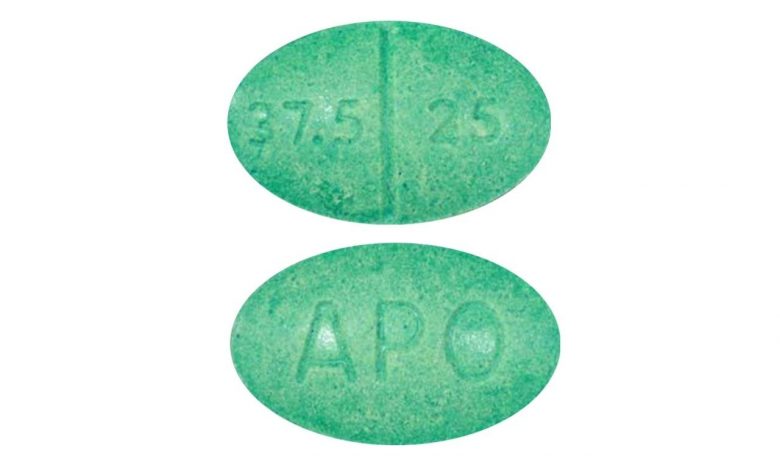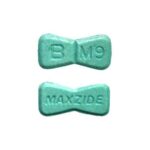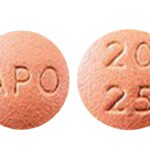Triamterene 37.5mg HCTZ 25mg : Uses, Dosage, Side Effects

What is triamterene 37.5mg HCTZ 25mg used for?
Triamterene HCTZ is a combination of triamterene and hydrochlorothiazide is used to treat high blood pressure and edema (fluid retention; excess fluid held in body tissues) in patients who have lower amounts of potassium in their bodies or for whom low potassium levels in the body could be dangerous.
The combination of triamterene and hydrochlorothiazide is in a class of medications called diuretics (‘water pills’). They work by causing the kidneys to get rid of unneeded water and salt from the body into the urine.
Hypertension is called a “silent killer”. Most people with hypertension are unaware of the problem because it may have no warning signs or symptoms. For this reason, it is essential that blood pressure is measured regularly.
When symptoms do occur, they can include early morning headaches, nosebleeds, irregular heart rhythms, vision changes, and buzzing in the ears. Severe hypertension can cause fatigue, nausea, vomiting, confusion, anxiety, chest pain, and muscle tremors.
What should I tell my healthcare provider before I take Triamterene HCTZ?
They need to know if you have any of these conditions:
• diabetes
• immune system problems, like lupus
• kidney disease or stones
• liver disease
• small amount of urine or difficulty passing urine
• an unusual or allergic reaction to triamterene, hydrochlorothiazide, sulfa drugs, other medicines, foods, dyes, or preservatives
• pregnant or trying to get pregnant
• breast-feeding
How to take Triamterene HCTZ 37.5 25 mg
Triamterene HCTZ 37.5 25 mg comes as a capsule and tablet to take by mouth. It usually is taken once a day. Take triamterene and hydrochlorothiazide at around the same time every day. Follow the directions on your prescription label carefully, and ask your doctor or pharmacist to explain any part you do not understand. Take triamterene and hydrochlorothiazide exactly as directed. Do not take more or less of it or take it more often than prescribed by your doctor.
Triamterene HCTZ 37.5 25 mg controls high blood pressure and edema but does not cure these conditions. Continue to take triamterene and hydrochlorothiazide even if you feel well. Do not stop taking triamterene and hydrochlorothiazide without talking to your doctor.
What should I watch for while using this Triamterene HCTZ 37.5 25 mg?
Visit your doctor or health care professional for regular checkups. You will need lab work done before you start this medicine and regularly while you are taking it. Check your blood pressure regularly. Ask your health care professional what your blood pressure should be, and when you should contact them.
Triamterene HCTZ 37.5 25 mg may increase blood sugar. Ask your healthcare provider if changes in diet or medicines are needed if you have diabetes.
You may need to be on a special diet while taking Triamterene HCTZ 37.5 25 mg. Ask your doctor. Also, ask how many glasses of fluid you need to drink a day. You must not get dehydrated.
You may get drowsy or dizzy. Do not drive, use machinery, or do anything that needs mental alertness until you know how this medicine affects you. Do not stand or sit up quickly, especially if you are an older patient. This reduces the risk of dizzy or fainting spells. Alcohol may interfere with the effect of this medicine. Avoid or limit alcoholic drinks.
Triamterene HCTZ 37.5 25 mg can make you more sensitive to the sun. Keep out of the sun. If you cannot avoid being in the sun, wear protective clothing and use sunscreen. Do not use sun lamps or tanning beds/booths.
What are the possible side effects of Triamterene HCTZ 37.5 25 mg?
Triamterene HCTZ 37.5 25 mg may cause side effects. Tell your doctor if any of these symptoms are severe or do not go away:
• frequent urination
• headache
Some side effects can be serious. If you experience any of these symptoms, call your doctor immediately or seek emergency medical treatment:
• difficulty breathing or swallowing
• dry mouth; thirst; nausea; vomiting; weakness, tiredness; drowsiness; restlessness; confusion; muscle weakness, pain, or cramps; fast heartbeat and other signs of dehydration and electrolyte imbalance
• feelings of numbness, tingling, pricking, burning, or creeping on the skin
• fever
• flu-like symptoms
• hives
• inability to move arms and legs
• itching
• loss of appetite
• pain in the upper stomach area
• rash
• slow or irregular heartbeat
• swelling or tenderness of stomach area
• unusual bruising or bleeding
• upset stomach
• yellowing of skin or eyes
If you experience a serious side effect, you or your doctor may send a report to the Food and Drug Administration’s (FDA) MedWatch Adverse Event Reporting program online (http://www.fda.gov/Safety/MedWatch) or by phone (1-800-332-1088).
Does Triamterene HCTZ 37.5 25 mg make you lose weight?
Triamterene HCTZ 37.5 25 mg is not a weight loss medication. Diuretics (water pills) cause you to urinate more to get rid of extra fluid in your body. This can cause weight loss, but this is water weight and not fat loss.
What may interact with Triamterene HCTZ 37.5 25 mg?
Do not take this medicine with any of the following medications:
• cidofovir
• dofetilide
• eplerenone
• potassium supplements
• tranylcypromine
This medicine may also interact with the following medications:
• certain medicines for blood pressure, heart disease like benazepril, lisinopril, losartan, valsartan
• lithium
• medicines that relax muscles for surgery
• NSAIDs, medicines for pain and inflammation, like ibuprofen or naproxen
• other diuretics
• penicillin G potassium
This list may not describe all possible interactions. Give your health care provider a list of all the medicines, herbs, non-prescription drugs, or dietary supplements you use. Also tell them if you smoke, drink alcohol, or use illegal drugs. Some items may interact with your medicine.





